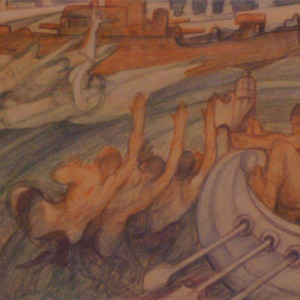 Giuseppe Rivaroli was born in Cremona in 1885. In 1928 in Rome he created two monumental works with his frescoes at the Office of the Ministry of the Navy. In 1932, also in Rome, he worked for two months on a large project for the decoration of the International Institute of Agriculture: a joyous exaltation symbolising Agriculture, rural life and the family firm. The scene is full of movement and vitality, and through the use of light shows the preciousness of the crops, fruit and flowers. It is particularly notable for its many nudes, all of which appreciate the careful study of the attitudes of the hands, and has feet placed with beautiful frankness in continuous evidence. After performing these masterpieces in Rome and also working in other cities of Italy, Rivaroli had a well-deserved reputation and was held in high esteem by critics and the public alike. At the age of 37 he lived at the same address in Rome as the artists Sartorio, Coleman, Carlandi and Costa. These artists had previously followed the same physical and spiritual path, with the same search of colours, images, sounds and emotions evident in their works. A painting by Rivaroli is never dark, it lives with its own light, the light that he is able to transmit in those who he most loved to paint: men, animals and the countryside. He died in Rome in 1943.
Giuseppe Rivaroli was born in Cremona in 1885. In 1928 in Rome he created two monumental works with his frescoes at the Office of the Ministry of the Navy. In 1932, also in Rome, he worked for two months on a large project for the decoration of the International Institute of Agriculture: a joyous exaltation symbolising Agriculture, rural life and the family firm. The scene is full of movement and vitality, and through the use of light shows the preciousness of the crops, fruit and flowers. It is particularly notable for its many nudes, all of which appreciate the careful study of the attitudes of the hands, and has feet placed with beautiful frankness in continuous evidence. After performing these masterpieces in Rome and also working in other cities of Italy, Rivaroli had a well-deserved reputation and was held in high esteem by critics and the public alike. At the age of 37 he lived at the same address in Rome as the artists Sartorio, Coleman, Carlandi and Costa. These artists had previously followed the same physical and spiritual path, with the same search of colours, images, sounds and emotions evident in their works. A painting by Rivaroli is never dark, it lives with its own light, the light that he is able to transmit in those who he most loved to paint: men, animals and the countryside. He died in Rome in 1943.




